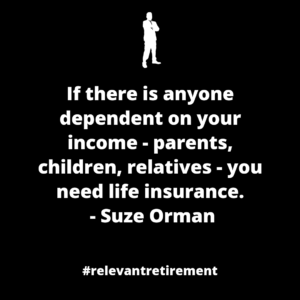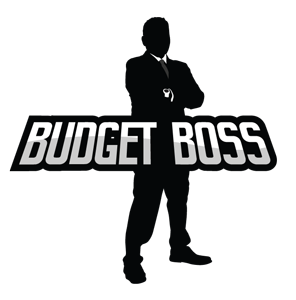Wednesday, September 25, 2019
How to Retire Relevant Step 4: Insurance
I will fully admit that insurance is not the most interesting part of financial planning. Most people cringe when they see the premium come out of their account every month. Despite this, it may be the most important factor in getting you to a healthy, comfortable and RELEVANT Retirement. Deep down we all know we need insurance coverage. The problem is what kind and how much. Insurance has become so incredibly confusing and the reason for that is quite simple. By making it confusing, the insurance industry now can sell you coverage that doesn’t suit you for a price you may not be able to afford. In any insurance purchase, there are only 2 factors: The need and the budget. The need is simple, what do you need to cover? The budget is simple as well, what can you afford? In Step 1 of my Relevant Retirement System, I explain the budget and how to create a monthly surplus. This monthly surplus is crucial to Step 4, as part of it will go to protection. In this post, I will explain the importance of insurance coverage as it relates to Retirement as well other insurance-related topics that will help you understand the coverage you need. Let’s get started.
Why insurance is important to retirement
Any financial planner worth their salt will proclaim the importance of adequate insurance coverage. For me, insurance is a vital part of all my client’s financial plans. By definition, insurance is the transferring of risk for you, the individual, to the insurance company. Essentially, the risk is what it could cost you should something go wrong. This cost is beyond what you can or wish to afford, so in turn you pay a premium for the insurance company to protect you from that risk. Some of those risks include accidents, healthcare costs, injury or illness, and even death. All those risks incur costs, sometimes very large ones. Where insurance comes into play in terms of your retirement, is the fact that incurring one or more of these costs puts your savings and investing plans in jeopardy.
Money does not come out of thin air; you will have to pay. Therefore, protecting your nest egg is vital. Protecting another valuable resource, time, is vital as well. Being in the industry that I am in, I see the results of having no insurance coverage, or not enough, daily. Families can and have lost everything. Their home, their savings, their possessions and the sanity along with it. In fact, there is no greater factor leading to the inability to retire comfortably than health reasons. 1 in 3 people will experience a significant health issue in their lifetime. How you deal with this issue will determine your retirement success. If you could, for a fraction of the cost, weather these storms and come out intact, would you not? The answer is simple. Everyone needs coverage and Step 4 of my Relevant Retirement System aims to make sure all my clients have the most coverage possible, for the cheapest price possible. That’s the goal, now the question is: What is the right coverage for you?
Essential forms of insurance coverage
Let’s get into the meat and potatoes of this post. What kinds of insurance are necessary to retire on top? Being in the industry myself, the amount of different personal insurance products is overwhelming even for me. When it comes to coverage, the simpler, the better. Long story short, if you don’t understand it, don’t get it. I will go over 4 key forms of coverage that everyone needs to have to Retire Relevant and why they are necessary.
Term Life Insurance
Term Life Insurance is about as basic as it gets. You pay a monthly premium and if you die it pays out the death benefit to your chosen beneficiary. There are very little frills with this product. The “term” refers to the amount of time that the price, or premium, is locked in. For instance, if you have 20-Year Term Life Insurance, the price you pay is guaranteed for those 20 years, after which the price goes up. Some examples of terms include 10-Year, 20-Year, 30-Year and even Term to 65, which locks in the price until you are 65 years old. The reason why I recommend Term Life Insurance is because it gets you the absolute most bang for your buck. You can get a decent amount of coverage for a very cheap price. This is very important while you are in the wealth accumulation phase of life and every dollar matters. As a rule, aim to cover yourself between 12-15 times your annual salary. (50K/annually = 600K to 750K of term life coverage) This will provide enough funds for your loved ones to weather the financial storm of losing your regular income. The monthly cost will depend on age, smoking status, health status and duration of the term. Overall, term life insurance is, in my opinion, the best way to cover against the catastrophic financial consequences of the loss of life.
11 Excuses to Not Get Life Insurance, and Why They Are BS – Budget Boss
Income Replacement Coverage (Disability/Critical Illness Coverage)
When asking most people about their most valuable possession, often their home or car will come up. In fact, the most valuable possession any of us will ever own is our ability to earn a living. It is this ability that allows us to buy that home and that car, as well as save and invest for retirement, not to mention survive everyday life. If this ability was taken from us, the results would be devastating. This is why proper disability coverage is vital to retirement. It is my recommendation that everyone has some form of income replacement coverage. For most, this will come in the form of workplace short- and long-term disability insurance. Most group plans will cover roughly 2/3’s of your income should you get hurt or sick. The legal limit for coverage is 80% of your income. It should be your aim to cover all the way up to the legal limit of coverage, depending on your jurisdiction. This may mean a small “top-up” of coverage to get you to where you need to be. Again, like term life insurance, disability coverage can be as simple or confusing as you make it out to be. Stick with basic coverage that also has a cost of living feature on it, to keep pace with inflation. Also, do not discount Critical Illness (CI) coverage. CI provides you with a lump sum should you develop one of 24 illnesses or ailments, the main three being cancer, heart attack, and stroke. As a rule, the equivalent of 1 year’s salary in base coverage should suffice. This will allow you to recover after a serious illness strikes. It fills the gap of base disability coverage and will allow you to seek proper treatment that may not be covered by government or workplace insurance plans. Disability and Critical Illness work hand in hand to protect your paycheck and financial plan.
Health Insurance
From someone that relies heavily on health insurance, having the right amount of coverage in this area is vital too. Much like income protection, health insurance often comes from your workplace. Where this is vitally important is for those who do not have workplace coverage or the self-employed. What people must realize is that although you may not be on any medications right now, that may not always be the case. Sadly, when you do need this form of coverage, it could cost you a fortune. Not only that, the care you receive may be substandard because of the type of coverage you have. I would recommend getting the most amount of prescription and dental coverage possible, for the cheapest price. Doing so may mean you have an annual deductible, which is okay. This deductible will keep costs low in the interim and it also helps stress the importance of an adequate emergency fund, see Step 2 of the Relevant Retirement System. Catastrophic medical or dental costs can set you back months or even years, so do not neglect to cover this area.
Home and Auto Insurance
While I admit this area is not my area of expertise, I do know the importance of these forms of coverage. Personal liability for home and auto are extremely important. For my area, auto insurance is mandatory to operate a vehicle. Likewise, home insurance is required as well with any home purchase. The reason is simple; you pose great risk to yourself and others when you own either a home or an auto. The key to these forms of insurance is much like the other ones mentioned already. Get the largest amount of coverage for the least amount of price. For your home, the building and its contents should be covered. You may not realize how much all the stuff you have costs, that is until you must replace it all. For auto, depending on your type of vehicle, collision coverage is important unless you drive an absolute junker of a car, in which case replacing it is not a backbreaking ordeal. As with health insurance, the most coverage for the least cost will entail a higher deductible, meaning again an adequate emergency fund is necessary. To achieve this goal, as with health insurance, make sure you get several quotes and always be sure to shop around.

Bad types of insurance coverage
Just like anything in life, there are good and bad forms of insurance. Part of why insurance bothers so many people is that they were probably sold one of these crappy types of coverage. Let’s take a look.
Balance protector insurance
This form of coverage is offered by debtors to cover the minimum payment of your debts should you become jobless. While that seems like a novel idea, the cost of the coverage is often absurd. I have seen this form of coverage charge as much as $1 for every $100 in debt. This could add up quickly especially if you have a large amount of debt, ($200/monthly for 20K in debt). It also hurts your ability to quickly pay down debt. Overall, it is a money grab for the banks so run for cover.
How to Retire Relevant Step 2: Debt – Budget Boss
Creditor Disability, Critical Illness, and Life Insurance
Much like the personal coverage I mentioned earlier, these forms of insurance pay of should you get hurt, sick or die. Unlike the ones previously mentioned, they pay the creditor the benefit and not you or your loved ones. They are often more expensive than personal coverage and are far less dynamic. Even worse, they may not even payout when you try to claim. These forms of coverage use what is called “Post Claim Underwriting,” which investigates whether you are insurable or not after you make your claim and not before they offer you coverage. This could cause you to think you are covered, when in fact you are not. Scary Stuff.
Mortgage Life Insurance
Like the above coverage, Mortgage Life Insurance protects the lender and not the homeowner. You will want to replace this form of terrible coverage with personally owned term life insurance instead. It accomplishes the same thing and pays the benefit to your loved ones and not the lender. It also uses post-claim underwriting which could lead to your family losing their home if the claim is denied. Personally-owned term life insurance is far more dynamic, reliable and is often cheaper than mortgage life insurance.
How to Retire Relevant Step 3: Housing – Budget Boss
Whole Life/Universal Life Insurance
One huge point of contention I have with the industry I work in is the proliferation of these 2 products. I have met very few people who these forms of insurance are suitable for. There are only several reasons one should get these products. Firstly, there will be expenses that come up at the time of your death that need to be covered, (burial, taxes, etc.) and you will not leave enough assets to cover them. A small whole life policy that covers your final expenses could be in order then. Also, if there is a massive gap in terms of estate equalization (amongst several heirs), a larger whole life policy may be in order and this idea will be mentioned in Step 6 of the Relevant Retirement System. Finally, you have some money from which you wish to leave to the next generation or a cause of your choice. For that task whole life makes absolute sense as the tax-free nature of insurance is a smart way to do so, and also will be brought up in Step 6. The average person does not fit these options, so whole-life or universal life insurance is not necessary. It is expensive and takes away your ability to save for retirement, pay off your home early, and live your life on the way to retirement. It is pushed heavily by the insurance industry because of the profit in generates for the agent and the company. Stick with basic term life insurance until you are ready to have deeper conversation about asset allocation requiring whole life insurance.
The industry of insurance
The insurance industry is a Trillion-dollar industry. That’s trillion with a “T.” It generates huge amounts of profits and those who work within it often make very, very good incomes. I want people to fully understand what this means to them. There are many in my industry who don’t always lookout for what’s best for the client. This is similar to almost all sales/service industry positions. When commissions are involved, the line between what is a good product and what is right for the client can often be blurred. Therefore it is important for you, the client, to have as much knowledge as possible. NEVER, EVER BUY SOMETHING THAT YOU DON’T UNDERSTAND. It is the job of the insurance advisor or agent to explain thoroughly what you are buying and what benefits it provides you and your family. It is your job to demand this kind of service. I have seen far too many unhappy people with terrible insurance products to know that this is not a huge issue. Make sure the person you select for your insurance needs has your best wishes at heart. This should be someone you would feel comfortable with showing up at your door the day after you die and helping your family through the claims process. This is a sacred role and sleazy salesmen should have no place in it. Period.
Interesting Insurance Stats
22 Million Canadians own $4.3 Trillion worth of Life Insurance coverage
24 Million Canadians have supplementary health insurance coverage despite our single payor system
6.4 Billion in death benefits paid out to beneficiaries (life insurance)
$388,000 is the average household life insurance coverage, which accounts for approximately 5 times the average household income in Canada
Cancer is the #1 cause of death in Canada
½ of Canadians will develop cancer in their lifetime
¼ of Canadians will die from cancer
The 5-year survival rate for cancer is 63%
13.7% of Canadians live with a disability
1.4 million disabled adults need daily assistance
1 in 7 people in Ontario have a disability, over the next 20 years that number will rise to 1 in 5
48% of Canadians could not survive a $200 drop in their income during any given month
178.5% is the debt to income ratio in Canada
Stats courtesy of the Canadian Life and Health Insurance Association (CLHIA)
Conclusion
Insurance gets a bad rap. I get it, it’s not fun. You don’t buy insurance to watch it grow, and if you did, you missed the point. I will say this, insurance might be the most important financial planning purchase you ever make. There is nothing, and I mean nothing, that can bring down your household faster and more efficiently than a health issue. I don’t say this as an insurance advisor. I say this as someone who has dealt with health problems for more than half his life. It is because of adequate coverage that I was able to brave through 2 chronic conditions and move on to start my own business, including the post you are reading right now. Since joining this industry, I have seen the devastation left behind from lack of proper coverage. I have also seen how having the right amount of coverage can change a family’s life. It is important to understand that insurance is not meant to make you rich. We have these grand illusions of someone hitting the lottery when we die because we bought a sweet life insurance policy. The truth is, nothing brings back the life lost. There is not one sick person that would not trade health for the money they receive from a policy. We assume what we know what it will be like to receive insurance benefits when in all reality, we have no clue. Those that know, thank god for the smart decision they or their loved one made. It is often the difference between a normal life and utter financial devastation. If this sounds grim, it’s because it’s true. I always ask my clients how much they think their life is worth. Often, they ask me back, how much do I think mine is worth? When I give a massive number they often chuckle. I stare stone cold. I made no joke. I am worth the world to those that love me, and so are you. When you truly realize this, you will begin to see how Relevant your future and Retirement can become.
“If there is anyone dependent on your income – parents, children, relatives – you need life insurance.” – Suze Orman

Want to get rolling with my 7-Step Relevant Retirement System? Click here to Book your meeting with the Budget Boss!
Email – joe@budgetboss.ca
Follow Budget Boss on – Facebook LinkedIn Twitter Instagram Pinterest Quora

